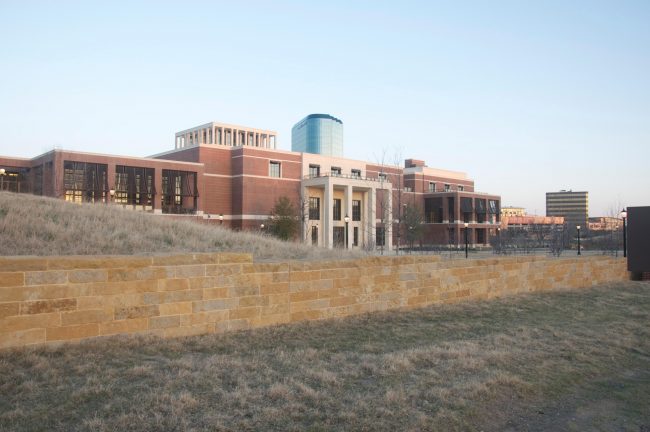
(Mona Kazim Shah)
The Dallas community came together at the JFK Memorial in downtown Dallas on Saturday evening, to support the freedom revolution in Syria and to raise awareness about it.
At least 600 to 800 people, including toddlers to the elderly, showed up to join the ongoing nationwide event called “Walk for the Children of Syria”.
The event is named after as the Syrian children who, it is said to have started this freedom revolution.
According to sources, these children, between 10 and 15 years of age, spray painted “It’s your turn, doctor” on the walls of their school in the small town of Daraa. They drew this graffiti under an already present message that read, “The people want to topple the regime”.
The doctor they were referring to is the Syrian President who is a trained ophthalmologist.
These children were reportedly detained for month and underwent severe beatings and torture by the local secret police. These detainees later came to be known as the “children of Daraa” among the Syrian freedom activists.
This rally is being organized all over the United States to help the children of Syria in raising awareness about the humanitarian crisis that has befallen the country as a result of the brutal anti-freedom crackdown under President Assad’s regime.
The protest rally in the Metroplex was sponsored by Coalition for Free Syria and SHAAM Relief Foundation, and the DFW chapters of Council on American Islamic Relations (CAIR), Muslims American Society (MAS) and Syrian American Council.
Ribbons, t-shirts, and nametags with actual names of the children who have died were distributed to the walkers. These names came from the Syrian Martyr Revolution Database that contains a list of 2449 children who have lost their lives in this bloodshed.
Dr. Zafar Anjum, a professor of Arabic at the University of Texas at Dallas and an Imam at the Islamic Centre at Frisco, who initiated the event by reciting a few verses from chapter 90, Al-Balad, of the Quran, said, “Islam is just not about offering five prayers and fasting, but its very basic teaching is to serve the humanity and to serve all the mazloom (oppressed)people who are deprived of their freedom, the freedom that was given to them by the Creator as their very basic human right.”
The emotion was high as protestors chanted slogans of “Free Syria” and marched around the memorial. “My friend in Syria asked me that if we die, can you build Syria again?” said Kenan Ajaj, a Syrian refugee who is currently seeking political asylum in US, was also present among the activists. Ajaj was shot in the knee when the Syrian army opened fire on some 10,000 unarmed protestors participating in a sit-in inside a mosque.
Board member of CAIR-dfw, Amina Rab, narrated a poem she wrote explaining the plight of the Syrian children, saying that when bombs explode and houses crumble, it’s the children that pay the price. “Our presence today, here, is a testament to the fact that we do care, we do see them, we do feel their pain and we do feel the suffering”, she added.
Mohamad El-Mardini, a board member of SHAAM Relief Foundation and Coalition For Free Syria, said, “To collaborate our effort with other communities nationwide, we decided to join the national Syrian American Council to convey a strong message to the officials in Washington, D.C. that the children of Syria shall not be massacred while us keeping silence.” Last month in Ramadan, the SHAAM Relief Foundation delivered over a 1000 food baskets that could feed a family of six for over a month to people in Damascus, Homs and other cities in Syria.
Karma Orfaly, 18, a freshman at Southern Methodist University and a spokesperson for MAS-dfw, said, “As a Syrian-American, who’s parents immigrated to this country looking for basic human rights that they were denied in Syria, I feel especially blessed to be here. That’s why I feel like it is my duty to stand up for those who are oppressed in Syria. It’s the least we can do.”
Reem Saenz, 27, a make-up artist originally from Mexico said, “You don’t have to be Arab or Muslim to stand up for the freedom of the Syrian people. You just have to be a human being.”
Ghassan Hitto, the president of SAC-DFW Chapter and a member of the SHAAM Relief Foundation, said, “My son, a UTD graduate, is currently working for humanitarian relief in Deir ez-Zorr, Syria. He told me that there are no fire fighters or ambulances or any emergency relief available. He has been gone for 110 days today, and there have been 110 bombings, and counting. The Syrian people are dying of hunger. However, the spirit of the people is high. The morale is high but they need our help. So if you are wondering what you can do, you should donate to any emergency relief organization you trust, whether UNICEF or SHAAM, but donate.” He also urged people to reach out to their politicians, write to them and educate them about Syria. Tell them that nations must come together and end this slaughter.
Odey Shahin, a spokesperson for CAIR and Abdullah Shawky, another UTD student, thanked the attendees and said that it is because of these people the children of Syria have hope.
An anonymous donor from the Syrian American Council has agreed to donate $5 on behalf of the first 5000 registered walkers. All the proceeds will go to UNICEF’s humanitarian effort in Syria.
According to the Syrian Observatory for Human Rights, it is estimated that more than 27,000 have been killed and thousands more have been injured. The number of Syrians fleeing the country has risen to approximately 235,000.









